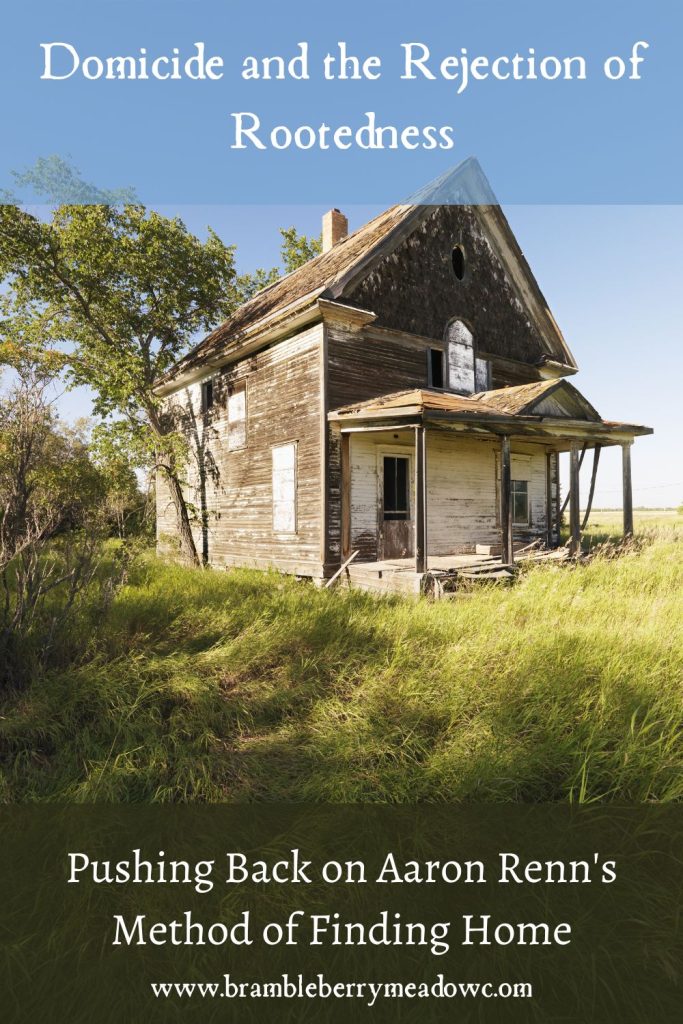Domicide and the Resistance to Rootedness
If you’ve spent much time reading here, or listening to the podcast, you’ll be aware that localism, rootedness, and love of place are something of a hobby horse of mine. You’ve probably also worked out from various references that I do a lot of reading, and listen to quite a few podcasts covering a wide variety of topics. Some of the subject matter are things that resonate with me, and others things I take issue with – to one degree or another. And many of them float somewhere in between.
Who is Aaron Renn?
Today, I’m going to take exception specifically to some of the arguments made or put forth by Aaron Renn that particularly stuck in my craw.
Now, I will first acknowledge the fact that I am definitively not Renn’s target audience. If you’re not familiar with him, he’s a writer, formerly associated with the Manhattan Institute, and currently styles himself as an “Influencer in the Man-o-sphere.” His past project, the Urbanophile, is representative of his interests and probably foreshadows what I’m going to gnaw on. One of his current projects, the American Reformer, is one I can get behind. And some of what he has to say I think has merit and ought to be heard more widely.
It was from Renn’s podcast that I first heard the term “Managerial Elite,” and a definition of a “Managerial Aesthetic.” His conversation with Dr. Benjamin Mabry was intriguing and led me to do some more reading on the topic. Renn is particularly direct in calling out the use of “premium mediocre” goods used as a way of signalling superiority by that top 20% who want so badly to differentiate themselves from the hoi polloi. Keep that in the back of your head.
The two episodes that I’ll mostly reference here are “Can You Be a Conservative in the City” and “Where Should I Live?“. (And, so that you know I’m not cherry-picking, I did also read the piece on being careful as regards online criticism. I doubt Renn will be too devastated by a deconstruction on a tiny blog, but note that I don’t find him to be a bad person – just blinkered and bubbled.)
My knee-jerk reaction was to flat-out fisk the “Where Should I Live,” episode. But, since the podcast itself is available for free (check your favorite podcast app), and the transcript is not, I’ll refrain.
So What Did He Say?
If you’re not in the mood to listen to the episode, I’ll hit the highlights for you, first. Renn walks his listeners through an analysis – if a somewhat one-sided one – of different factors to consider.
First, the policial climate of your potential home – on the local, state, and federal levels. Renn recommends that you consider what the politics of your potential neighbors will be. And also that you should remember that one-party rule leads to disfunction – and with that concept, I will agree.
He then breaks down the options: City, suburb, small town, rural. First you get his rural “street cred.” And then you get his breakdown of the other options, which don’t really include the rural option at all. (He covers it more – with a deep-seated animus against it – in the other episode I mentioned).
Let’s unpack some of what he says – and what he doesn’t say.
First, his assessment of city centers primarily revolves around walkability and “features” – like access to museums or the opera. He does touch on the fact that the people who live in these places tend to be very strongly progressive in politics and social opinions. And even shares a story about a local donut shop that was put out of business for failing to care sufficiently about the Current Thing(TM). What he leaves out is the fact that if you choose to live amongst these people and you don’t share those views, you had better keep your opinions to yourself or you’ll suffer the same fate.
His breakdown of the different types of suburbs is pretty accurate. He even touches on municipalities that are facing imminent insolvency due to the inability to fund their infrastructure and liabilities. Keep that in the back of your mind for a few minutes. And note that he doesn’t touch on the fact that MOST municipalities are onthe edge of insolvencey – they’re just not saying so.
There follows a segue where Renn geeks out on the things he knows about urban areas and their surrounding regions, enumerating what things are available only there – professional sports, top level health care, airports, and so on. He isn’t wrong about these things. And he’s careful to differentiate “true urban” from small towns.
Small towns are not beloved by Renn. Small towns are not even represented fairly by Renn, who views them as dirty little opium dens populated by single mothers scraping by and dimwitted trolls who work for the sole employer in town. He seems to be of the opinion that the residents are bereft of anything resembling health care beyond the local barber/surgeon. And if you’re located away from a large hub airport, well – clearly you’ve been exiled! Small towns are only worthwhile, in Renn’s view, if they are college towns. And they’d still better have easy access to a major airport. And revitalizing small towns can only be accomplished by development “at scale” and turned into Yuppieville.
Then, as a wrap-up, Renn shares that his family is moving into the Indianapolis suburb of Carmel. Jaw, meet floor. And finally finishes by really removing the mask. Renn considers himself of the Elite. And the advice he is providing in this podcast (and the other episode) is aimed exclusively at the Madarin/Laptop class.
Where Do I Push Back?
First, the inherent assumption that everyone values “high culture” as much as Renn does. Fun fact: Much of “high culture” as practiced in urban centers is as much “premium mediocre” as a Coach purse. Especially when it comes to the theater. I’m not against concerts, opera, ballet, or museums. I’ve been to my share from Handel’s Messiah at Christmas to “The Pirates of Penzance” to Stratford’s Shakespeare Festival. But I don’t consider it something to order my life around, and I would bet that most people are in the boat. I’m perfectly content to make a trip to see “Riverdance” something of a special outing, for which I may drive an hour or more.
Second, the purported amenities of urban areas – which he sings the praises of more directly in “Can you be a Conservative in the City.” Renn argues that you might not be able to get all the things you want readily, if you move into a small town or rural area. He states it as “you might not be able to get the brands you prefer,” but what he really means is, “one does not simply walk into Mordor and visit a Whole Foods.” Allow me to differ both to content and sentiment, here. This seems to mostly speak to people who are buying highly processed foods. Because you can get the basic elements of food, as my husband calls them, pretty readily. More readily, in fact. The local tiny grocery chain actually stocks a lot more Michigan-grown frozen fruit than the regional or national chains that have outposts both here and in the nearest urban center. In season, I can find a much wider and better variety of produce from farm stands and markets than you’ll see in the average urban grocery store. Yes, I buy things like spices mail order. Ooooh. The tragedy of having to order things online.
But – and it’s a big “but,” you can live in an urban center and still be unable to get the things you want locally. I stopped in on Friday at the (very large) Barnes and Noble in the nearest urban center, intending to get some new reading material. I left empty handed. Stacked to the rafters with copies of “Spare,” and the latest tomes on all the most progressive topics, the store was utterly devoid of anything by Os Guiness or Nicholas Kotar – my targets for the trip. Even the “Literature” section was disappointing – one slim volume from T.S. Eliot and almost nothing by Flannery O’Connor. The clerk offered to order something for me and have it “shipped to the store for free.” But how is this better or easier than Amazon, direct to my door?
I can acknowledge the medical facility issue, although it isn’t as profound as he may think it is. I have some rather intimate experience with the NICU, as well as some other services that we did have to travel a bit for. But the local hospital is by no means incompetent. And much more able to provide all but the most specialized services. I’d say that the availability of longer term programs for both of my children – both public and private – has had a more confining effect on where we choose to live than who has a Level 1 Trauma Center. And that seems to have much LESS to do with whether an area is urban or rural and much MORE to do with how much the people in that area value, fund, and provide those services. That, in turn, seems to be tightly linked to the more-strongly-than-average religious leanings ofthe community and its tradition for philanthropy. Both from the wealthy and from the local middle class.
Airports. What even is that about? This is the largest “tell” that Renn considers himself a part of the jet-set. I’m sorry, most people aren’t particularly concerned about how near or far the airport is, within a certain degree of reason. I’ve taken a trip that involved air travel exactly twice in the last 5 years. The opportunity exists, but I find it so rage-inducing and draining that I avoid it when I can. Most of my friends and acquaintances would probably say the same. I suppose, if your job requires frequent travel, this might be an issue. But even then, less than Renn implies. Back in my high school and college days, my Dad traveled about 2 weeks out of every month. I know, because it was my job to pick him up, most of the time. We lived a bare three miles from the local airport. It had about 6 gates, and was “International” because you could fly to Canada. And most of the time, Dad hopped a flight there to Detroit or another hub – then on to his destination. And you know what? That was considered a small price to pay for not actually living in Detroit.
In both episodes – but more directly in the earlier – Renn makes sure to mention that those of the Annointed should think carefully about moving to a small town because the lack of people with college degrees will mean you don’t have any opportunity to socialize.
The sheer, towering arrogance of this argument makes me spit nails. And Renn isn’t the only one to put it forward. I’ll share a quote from the comments section of The Front Porch Republic that illustrates this attitude in all its, ahem, “glory.”
1. The unavailability of interesting work. The cognitive elite leave home and move to the city for one simple reason: That’s where they can find work that challenges and interests them.
2. Even if you’re willing to compromise a bit on work, those who have stayed behind aren’t so interested in having you join them. They know that they’re mediocre and that you’re not. And people don’t like to be shown up, even if it’s by someone who’s kind and gracious and humble.
3. You can’t undo the shaping that your experiences have had on you. You can’t spend a decade in Arlington or Brooklyn or Cambridge, and then go back to Toledo and be the same person you were when you left. You’ve seen the world now. And having done so, Applebee’s just isn’t as tasty as it was when you were 16.
I find 2 particularly infuriating. If this is a sample of the attitude with which the average member of the “intelligentsia” returns home, it’s no wonder that it goes so poorly for them. I’ll restrain myself to a few remarks on this topic. First, credentials do not equal education. And most people who’ve graduated from college in the last twenty years are credentialed, not educated. Oh, they may be able to quote chapter and verse at you from “White Fragility” or “Intercourse” by Andrea Dworkin. But most of them have perhaps a passing acquaintance with the Western cannon and no ability to think critically – when that is not being used as a code word for “countering an argument by stating I don’t like it.” There are quite a lot of people without college degrees who are intelligent, erudite – and much less self-absorbed than the twit who left this comment.
And then let’s talk about college towns. Normal people who aren’t professional activists or professional drunks are not all that enamoured of college towns. Yes, there are some of Renn’s touted “amenities” – usually some sort of orchestra, theater, museum, and the like. But you must also deal with college students. And drunken alumni every game day. To say nothing of burning cars and couches whenever a major title is won. College towns, for the most part, appeal to people who view their college years as the best of their life and want desperately to extend or recapture them. They might be the MOST rootless, transient type of place to live.
As to Renn’s “critique” – or rather screed – regarding small towns, it’s both an overreach and an oversimplification. I find it interesting that he feels the need to point out the drug problem that some struggling small towns grapple with – while no mention at all was made of drugs and homelessness issues encountered in urban areas. Hmmm. Interesting.
And the stereotype of the empty, gutted small town has been overplayed. Look to Selena Zito (if you don’t follow her work, you should) for genuine portraits of small town life. I’ll link this article, because I’m sure that Renn has read and internalized “Bowling Alone.” Possibly with a certain degree of self-satisfaction at his own escape.
Why the Reaction?
To understand my reception of Renn’s intention of moving to Carmel, IN with shock, one must spend a little time in the world of the urban planner. And recognize that Carmel is a town people either love or hate, in it’s concept. Short version – Carmel is a very affluent town that has leveraged its assets and annexed smaller municipalities in order to attempt to build The Perfect Town in one go. My suspicion is that this isn’t going to work out nearly as well as they think it is. I’m not only one who thinks so, and I’ll let Chuck Marohn explain why.
Renn is of an age with me. Old enough to remember when cities were places that most people who didn’t live there just didn’t go. Dad could tell some hair-raising stories about 1968 Detroit. Even when I was a newly-minted driver and just pushing for independence, there were specific parameters about where I was and was not permitted to go. With most of the “no-go” areas consisting of particular regions of both Flint and Detroit. Over time, much of this improved. Cities were revitalized. Even I spent more time in them. I love a museum. When my oldest daughter was around 9 years old, the American Girl store in Chicago was a must-do. But we are, very rapidly, sliding back into the conditions that brought us the urban blight of the 60’s and 70’s. Nor does anyone seem to be interested in doing anything about it. Flight of the affluent has already begun. Only this time, we can’t just continue building new cardboard suburbs (I will agree with Renn on the low quality and unlikelihood of lasting value of New Suburbia). We’ve hit the limits on the infrastructure we inherited from the post-War years.
Maybe, just maybe, small towns still have their place in the fabric of American life. I don’t think it’s time to place a white lily on the breast of the domus and declare that hearth and home are a quaint habit of the past that we’ve become to sophisticated to want or need. Or at least to value over a really good cup of coffee.
In the end, intentionally or otherwise, Renn suggests that one choose where they live in much the way one chooses which hotel to stay at while on vacation. Pool? Continental breakfast? Hot tub? Restaurant? Whiskey Bar? And, if you are only planning to stay five years, before moving on to the next “phase of life,” this makes some sense. But it is the epitome of living like the Managerial Elite. Of placing yourself into the world strictly as a consumer. Of doing nothing but consuming that which is produced by the toxic swill of modern culture. It makes nothing. It conserves nothing. It leaves nothing better than it was found, no matter how many “think pieces” one writes.
And is the antithesis of rootedness, community, and a strong sense of place. I suppose we could liken Renn to the hobbits who stay in the Shire. Content with comfort – food, merriment, and singing – and forever ignorant of the change that can only be had by doing hard things because they must be done by somebody. Bilbo comes back to the Shire – and the stories that he tells prepare Frodo and Sam for the journey they must undertake. Sam, Merry, and Pippin all return to the Shire changed from their time out in the world. But they come back to the Shire afterward, serving as stewards and historians. Note that they don’t flounce off in disgust because the other hobbits can’t sing Elven marching songs or debate the finer points of the fighting styles of Gondor vs. Rohan. Come to think of it, maybe he’s more like Tooks, absconding one day never return and thereby existing in the collective memory more as a cautionary tale than anything else.
I’ll be back later to try to articulate my conception of what “home” means. Mostly because that’s the basis for why Renn’s advice flipped my switch. His thoughts when it comes to issues int he church and among conservative though are worth listening to, with a critical ear. But assume he has a bugbear about rural living and ignore his advice on the topic. For now, I recommend hitting The Front Porch Republic if you want a more nuanced discussion on localism in various types of place.







